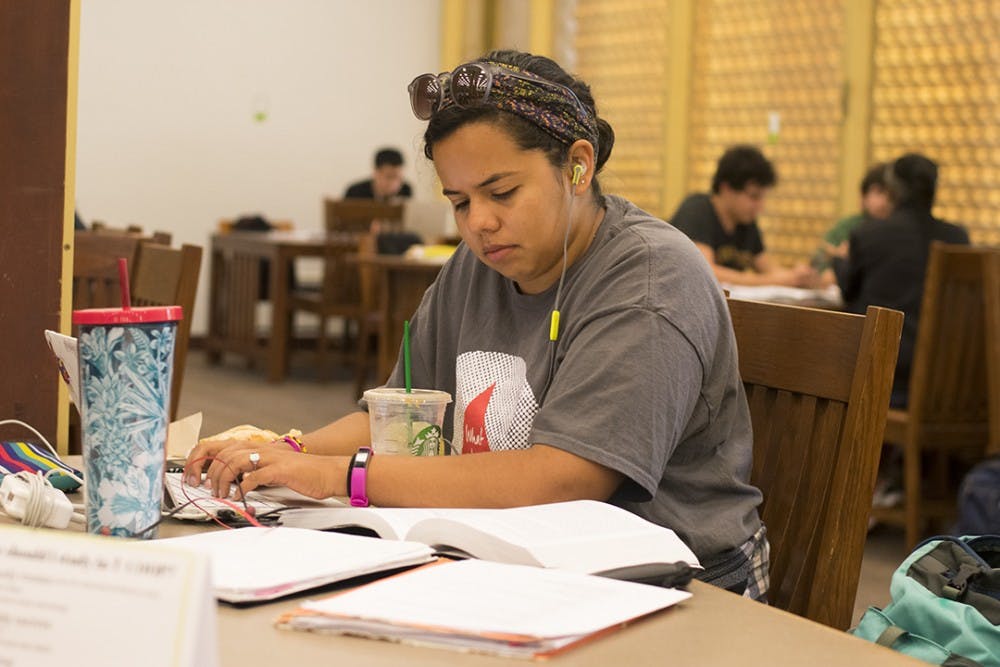Students often report experiencing stress throughout the academic year, and some say exams could be responsible for heightening that stress. However, not all students feel stressed during exam periods, and it’s not only students that experience stress — professors can, too.
Justina Siuba, program coordinator for stress management at the Center for Health and Well Being, tries to help students prevent stress.
"Stress is a way our bodies respond when we encounter a perceived threat," Siuba said.
Siuba explained that those threats can vary widely, including anything from arguments to car accidents. The symptoms of stress are also diverse. In fact, there are a wide variety of stress symptoms depending on the person.
Common symptoms include headaches, upset stomach, sleep deprivation, chest pains, increased breathing patterns, and changes in eating habits.
"One of the worst things is the impact it has on our heart because of that acceleration of our heart rate," Siuba said. "That can cause issues like hypertension from having so much stress all the time ... the long term effects are definitely there."
Since there are so many variables when it comes to stress, the Center for Health and Well Being splits the symptoms into four categories: physical, emotional, cognitive and behavioral responses. This allows counselors to categorize responses to help students manage their stress.
The Center for Health and Well Being recommends students learn techniques and methods to help them prevent stress rather than trying to counteract stress.
But preventing stress isn't always easy. Midterms and final exams typically account for a large portion of a student's grade, which may cause them to worry more about doing well on them.
Alayna Etheridge, a second-year biology student, says she suffers from some stress-related symptoms around exam time.
"Lack of sleep, really just worried about everything, lots of anxiety," Etheridge said. Etheridge also said that she spends anywhere from two hours studying for "easier" exams to more than 12 hours studying for chemistry exams.
Etheridge said she doesn't know of any tips to help her reduce her stress.
However, not all students suffer from stress-related symptoms. J.P. Hovey, a fourth-year broadcast journalism student, says he doesn't really experience any of the symptoms of stress.
But his roommate does, and according to Hovey "it doesn't look like a good time." He said his lack of stress is related to time management. Hovey is out of class by 3:30 p.m. which he says gives him time to study, workout and still able to sleep without stressing too much.
Matthew Floyd, a fourth-year history major, also said that he doesn't experience much stress with his exams, mostly due to his study process.
"It's not a very stressful situation," Floyd said. "I study a couple of hours each day, and I take a break in between those hours and then I try to study again."
The stress professors felt was something a little different from their students. Robert McKeever, an assistant professor in the School of Journalism and Mass Communications, who worries about his students’ success.
"We all feel this heightened feeling of stress," McKeever said. "We do want our students to do well."
McKeever has his own way of helping his students better prepare for his exams in class. McKeever devotes half of the class period before to review material on the exams and point his students to other helpful resources. He also splits his exams throughout the course "to try and alleviate some of that stress," so one specific exam doesn't weigh so much on the students' final grade.
Along with the stress-less students are some professors like Andy Burns. Burns is a broadcast journalism professor who does not get stressed about exams. In fact, he enjoys giving exams because he see it as a break from lecturing. But Burns did say has lost sleep over his Journalism 499 skills classes, which have smaller class sizes.
“Stress is being attacked by Boko Haram in Africa, being in North Korea — that’s stress,” Burns said.
Burns wanted to make clear he was not intentionally discounting anyone’s personal experiences but does wonder if we create our own stress by overanalyzing it.
“I’m not discounting mental illness at all, or real depression or the stressors that come,” Burns said. "Just this whole idea that 'oh my God studetns today are so stressed out' is like ... really?"
As finals week rolls around, the Thomas Cooper Library remains open 24 hours a day. Walk-ins are also accepted for Counseling and Psychiatry Services.

